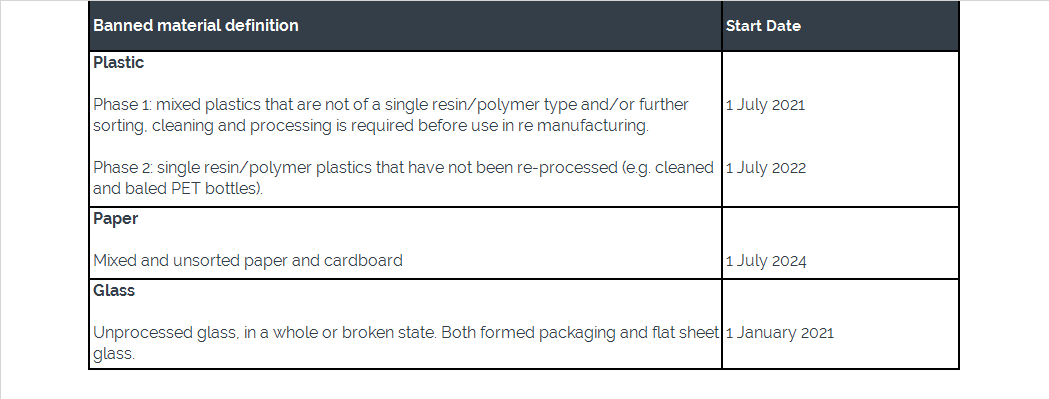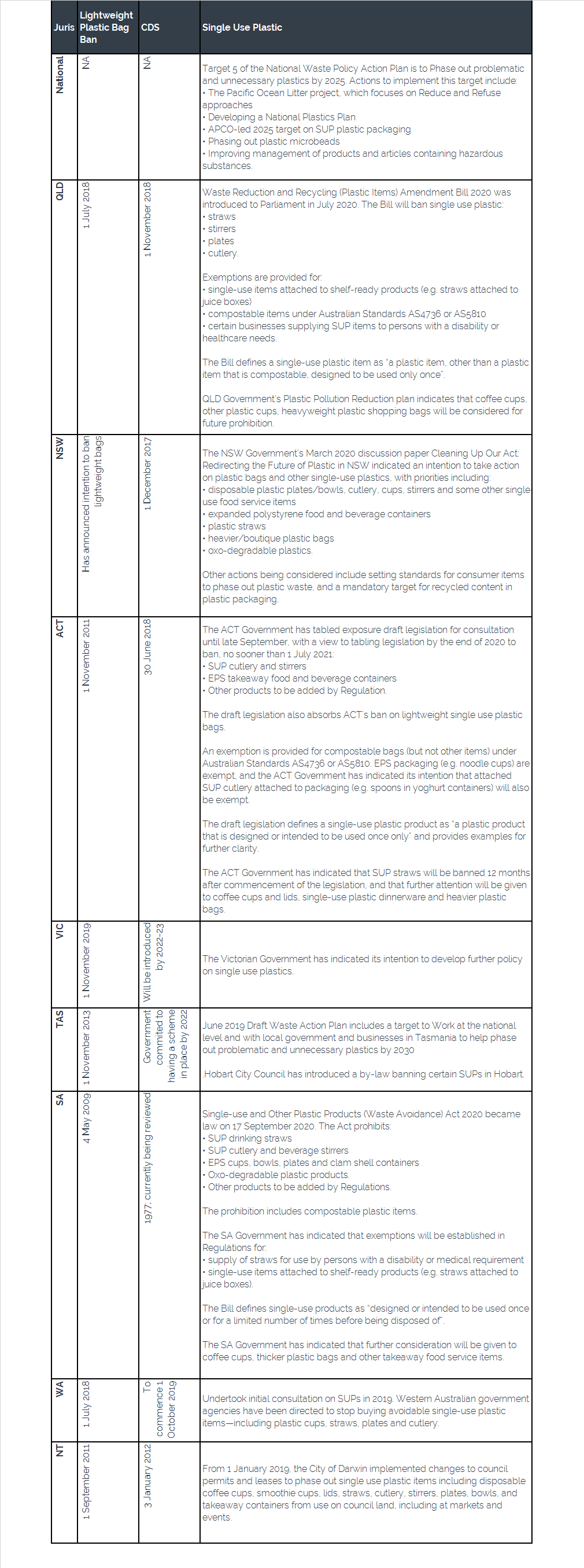Government Update
21 October 2020
The Commonwealth Government has introduced legislation into Parliament to give effect to the waste export bans and update the national product stewardship legislation, while South Australia became the first state to legislate a ban on some single-use plastic items, with Queensland and the ACT set to follow. Across the ditch, the New Zealand Government is also consulting on a proposal to phase out some hard-to-recycle and single-use plastic items, and has announced that it will establish a mandatory product stewardship scheme for plastic packaging.
New Zealand Government announcements on plastics
Consultation on hard-to-recycle and single-use plastics
The New Zealand Government is consulting on a proposal to phase out certain hard-to-recycle plastic items and single-use plastic items. A consultation document, ‘Reducing the impact of plastic on our environment’ was published in August and is available here.
Hard-to-recycle plastics are proposed across two stages:
- Stage 1 is proposed for phase-outs to be in place by January 2023 and includes:
- All PVC food and beverage packaging
- Some polystyrene food and beverage packaging
- All oxo-degradable plastic products.
- Stage 2 is proposed for phase-outs to be in place by January 2025 and includes:
- All remaining polystyrene food and beverage packaging
- All other expanded polystyrene (EPS) packaging (e.g. EPS packaging used in homewares and electronics).
Seven single-use plastic items have been identified for phase-out. A timeframe has not yet been set out for phasing out the seven items, but the intention is that the phase-out will be completed by 2025. The seven single-use plastic items proposed for phase-out are:
- Plastic straws
- Plastic cotton-buds
- Drink stirrers
- Tableware (e.g. plastic plates, bowls, cutlery)
- Some single-use cups and lids, made from hard-to-recycle plastics (types 3, 4, 6 and 7 or plastic lined paper cups) – excluding disposable coffee cups
- Single-use produce bags
- Non-compostable produce stickers.
APCO Members with interests in New Zealand are encouraged to participate in the consultation process. The deadline for written submissions is 4 December 2020, and information on how to make a submission can be found here.
Mandatory product stewardship for plastic packaging
The New Zealand Government has announced that it will develop a regulated product stewardship scheme on six priority products. Products to be regulated are: plastic packaging, tyres, e-waste, agrichemicals and their containers, refrigerants and farm plastics.
New Zealand currently has 15 accredited voluntary product stewardship schemes but, following consultation in 2019, the Government has decided that regulatory schemes are needed to ensure a level playing field and ensure involvement of stakeholders across the supply chain.
The Government has in place a process for co-design of product stewardship schemes. Co-design has been completed or commenced for 5 of the 6 priority products, but has not yet started for plastic packaging. Work on the product stewardship scheme will be progressed in the coming year alongside work on the phase-out of hard-to-recycle and single-use plastic items.
Recycling and Waste Reduction Bill
The Commonwealth Government’s Recycling and Waste Reduction Bill was introduced to the Commonwealth Parliament on 27 August. The Bill will give effect to the waste export bans and replace and update the Product Stewardship Act 2011.
Waste export ban
The Recycling and Waste Reduction Bill will give effect to the waste export bans. Commencement dates for the bans relevant to packaging are provided in the table below.
Product Stewardship
The Bill will replace the Product Stewardship Act 2011, with a small number of changes that reflect the outcomes of the review of the Product Stewardship Act.
- Changes as a result of the review include:
- Inclusion of product design in the objects of the Bill
- Inclusion of recommended actions and timeframes and provision for consultation in relation to the Minister’s priority list
- Opportunity to seek accreditation of voluntary arrangements at any time
- Greater flexibility for the Department to manage the Product Stewardship Logo
- Provision for the Minister to table information in Parliament about the performance and coverage of accredited voluntary arrangements
- The application of compliance and enforcement provisions to the accrediting authority for voluntary arrangements, which will be an important accountability mechanism in the event that a central clearinghouse is established
- Provisions for mandatory product stewardship rules in relation to product design and the durability and repairability of products.
Senate Inquiry
Shortly after it was tabled in Parliament, the Bill was referred to the Senate Environment and Communications Legislation Committee for inquiry. APCO provided a written submission to the Inquiry and appeared at a public hearing on 18 September.
The Committee’s report on the Inquiry was released on 1 October. It documents that the legislation enjoys almost universal stakeholder support, making it likely that it will be passed without too much delay. The Committee made only four recommendations, including that the Bill be passed, that the Environment Department continue to engage with stakeholders, that all three tiers of government coordinate their efforts in implementing the Bill, and that cost benefit analysis for major waste infrastructure projects be expedited.
Although not referenced in the Bill, APCO and the 2025 National Packaging Targets were discussed at length in the Senate Inquiry. While differing opinions were given for or against voluntary or mandatory approaches, it was clear that there is broad support for the 2025 Targets and an assumption that APCO will continue to administer them regardless of the legislative framework and regulatory approach.
One outcome of the Inquiry was that it is clear that there is an expectation that APCO will apply for accreditation as a voluntary product stewardship arrangement under the new legislation.
The other Senate Inquiry – the one that began in 2019 into the Product Stewardship Amendment (Packaging and Plastics) Bill 2019 – has not yet been completed. APCO gave evidence at a public hearing on this Inquiry into the Greens’ Private Members’ Bill in July. The reporting date for the Inquiry has been postponed until early 2021, by which time it is likely that the Government’s Recycling and Waste Reduction legislation will have been passed and a review of the National Environment Protection (Used Packaging Materials) Measure (the NEPM, which is the legislation underpinning the Australian Packaging Covenant) will have commenced.
State Government legislation and Parliamentary inquiries
SA single-use plastics (SUPs) legislation and Parliamentary inquiry report
On 17 September, South Australia became the first jurisdiction to enact SUPs legislation, with its Single-use and Other Plastic Products (Waste Avoidance) Act 2020. The Act prohibits:
- SUP drinking straws
- SUP cutlery and beverage stirrers
- EPS cups, bowls, plates and clam shell containers
- Oxo-degradable plastic products.
- Other products to be added by Regulations.
The prohibition includes compostable plastic items.
The SA Government has indicated that exemptions will be established in Regulations for:
- supply of straws for use by persons with a disability or medical requirement
- single-use items attached to shelf-ready products (e.g. straws attached to juice boxes).
In an unrelated matter, the South Australian Parliament’s Environment Resources and Development Committee released a report in late July on its inquiry into the recycling industry. Two of the report’s 19 findings directly concerned packaging, including:
- a lack of available data and knowledge on the lifecycle of products and packaging is hampering resource recovery
- State and local governments have an important role to play in creating markets for recycled content in products and packaging.
Four of the 16 Recommendations for the state government referenced packaging directly:
- Recommendation 2: Participate in the Meeting of Environment Ministers (MEM) to drive consistent use of Australian Standards on recyclable and compostable products and packaging.
- Recommendation 3: in collaboration stakeholders, consider economic and legislative levers to drive greater use of recycled content in products and packaging.
- Recommendation 6: In collaboration with stakeholders, develop a strategy and action plan to identify and address data and knowledge gaps in the life cycle of products and packaging.
- Recommendation 8: in collaboration with stakeholders, investigate and consider implementing changes to packaging and products legislation/ policy that could be undertaken at a state and local level.
QLD Parliamentary Committee on QLD’s SUPs Bill
The Queensland Government’s Waste Reduction and Recycling (Plastic Items) Amendment Bill 2020 was introduced to Parliament in July 2020. The Bill will ban single-use plastic straws, stirrers, plates and cutlery.
Exemptions are provided for:
- single-use items attached to shelf-ready products (e.g. straws attached to juice boxes)
- compostable items under Australian Standards AS4736 or AS5810
- certain businesses supplying SUP items to persons with a disability or healthcare needs.
In August, the Queensland Parliament’s Natural Resources, Agricultural Industry Development and Environment Committee completed an inquiry into the Bill, and its report was generally supportive. Two of the five recommendations were relevant to APCO:
- Recommendation 2: The committee recommends that the Bill be amended to include expanded polystyrene takeaway food containers in the first tranche of banned single-use plastic items.
- Recommendation 3: The committee recommends that the Queensland Government work with other stakeholders within the Australian Packaging Covenant Organisation to accelerate support for businesses to transition away from single-use plastic items, including expanded polystyrene products.
The other three recommendations were to pass the bill, and to consider a couple of matters as part of a review of the legislation after two years, including the exemption of schools from the ban on supplying SUPs and the penalties for providing false and misleading information on SUPs (which includes greenwash in relation to compostables).
ACT exposure draft legislation on SUPs
The ACT Government has tabled exposure draft legislation for consultation, with a view to tabling legislation by the end of 2020 to ban, no sooner than 1 July 2021:
- SUP cutlery and stirrers
- EPS takeaway food and beverage containers
- Other products to be added by Regulation.
The draft legislation also absorbs ACT’s ban on lightweight single use plastic bags.
An exemption is provided for compostable bags (but not other items) under Australian Standards AS4736 or AS5810. EPS packaging (e.g. noodle cups) are exempt, and the ACT Government has indicated its intention that attached SUP cutlery attached to packaging (e.g. spoons in yoghurt containers) will also be exempt.
Single-use plastics comparison update
A summary of the status of action on single-use plastics across all Australian jurisdictions is given in the table below.

